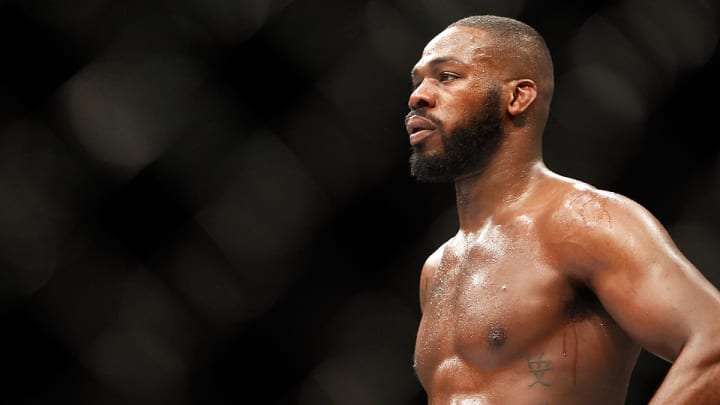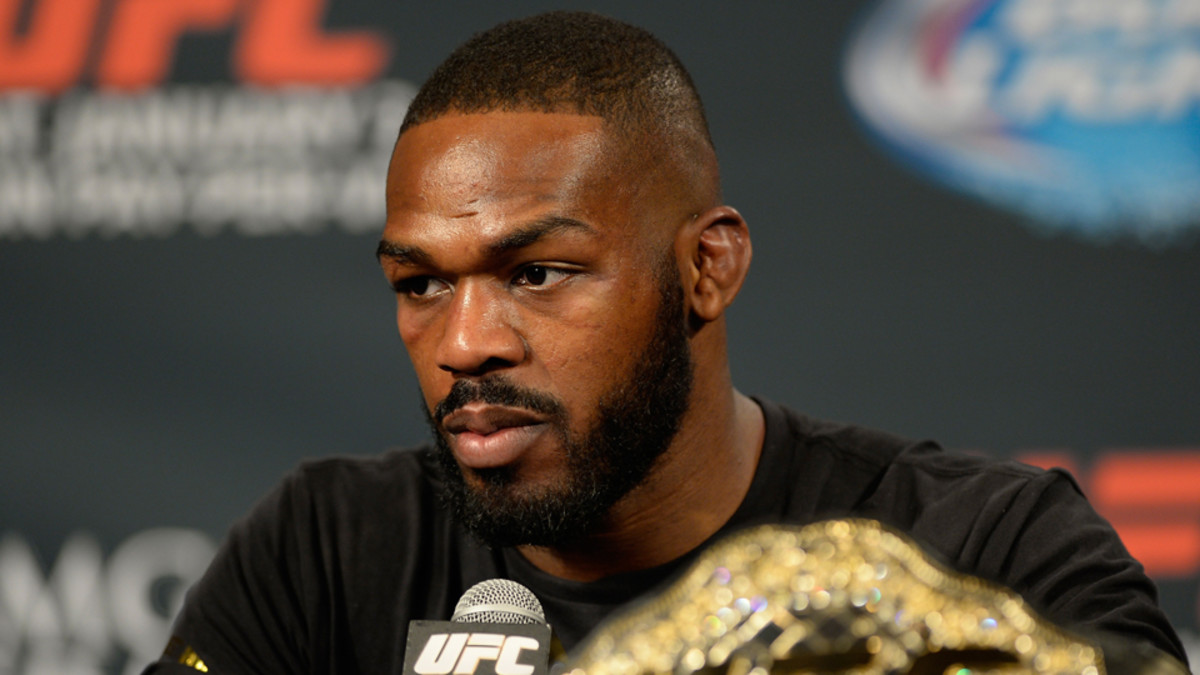Jon Jones' cocaine revelation shows contradictions in UFC drug policy

The career-defining moments keep on coming for Jon Jones.
Three days after the weekend’s stirring victory over a vaunted opponent in an anticipated grudge match, the UFC light heavyweight champion announced Tuesday that he had entered a drug treatment facility after testing positive for the main metabolite of cocaine.
The stunning development was first reported by Kevin Iole of Yahoo! Sports, who detailed a random drug test conducted by the Nevada Athletic Commission in which benzoylecgonine was detected in the fighter’s system. The test was conducted Dec. 4, 30 days before UFC 182, the Las Vegas fight card where Jones was scheduled to defend his title against two-time Olympian wrestler Daniel Cormier.
That time frame is key. The Nevada commission follows testing protocols of the World Anti-Doping Agency, under which benzoylecgonine is not banned out of competition. Therefore, the commissioners did not prevent Jones from fighting -- he handed Cormier his first defeat, via unanimous decision, on Saturday -- or otherwise penalize him.
Naturally, when an athlete fails a drug test and is allowed to compete a few weeks later, eyebrows will be raised. Jones vs. Cormier was a big-money fight between the sport’s crème de la crème, and its profile was elevated considerably when the fighters brawled at a summertime press conference. They insulted and threatened each other on national television later that day, and kept the acrimony brewing throughout the fall.
On fight night, UFC president Dana White gleefully proclaimed that pay-per-view buys appeared to be surpassing his earlier estimate of 750,000, a number the fight promotion had reached barely a dozen times in its two-decade history. If this ballyhooed bout had been canceled, it would have been a kick to the gut -- and wallet -- for the UFC. And the State of Nevada wouldn’t have received its cut.
However, according to the Yahoo report, the fight was allowed to go on only after Jones was tested later in December and passed. Commission chairman Francisco Aguilar also told Iole that at its next meeting the sanctioning body will consider straying from the WADA code, particularly as it relates to out-of-competition testing.
The Jones news drew some harsh reaction, not all of it aimed at the fighter. On social media, fans and fighters alike raised the specter of a double standard in a sport where athletes -- of a lesser status than Jones, that is -- have been fined, suspended, had victories taken away, even been fired from their jobs after testing positive for recreational substances. Now, few would disagree that the drug policies at athletic commissions and within the UFC have been askew. Until recently, fighters were being punished harshly for using marijuana -- hardly a performance-enhancing drug for elite athletics -- but could receive authorization to inject synthetic testosterone, a virtual fountain of youth.
The disparity between the consequences fighters typically face for drug-test failures and the lack of formal sanctions faced by Jones can be reconciled by taking into account the variables: when the tests take place, what drugs are found in the athlete’s system, etc. PEDs typically are banned in and out of competition; cocaine, apparently only in competition. So when former UFC lightweight Melvin Guillard was suspended for eight months and fined $2,100 by the Nevada commission after testing positive for cocaine back in 2007, it was because the drug was detected in a urine test he undertook shortly before stepping into the cage to do battle.
Still, that the Nevada commission and the UFC knew the result of Jones’s test prior to the Saturday’s big fight and kept it under wraps does sully everyone involved, even if there were legal parameters -- not just moneymaking concerns -- compelling officials to bite their tongues.
There are so many contradictions here, really. For Jones to have performed with the violent virtuosity that he did, all the while knowing that the Sword of Damocles was hovering above his head -- is a testament to his extraordinary mental focus. Yet that same person apparently fell prey to cocaine.
• Jon Jones tests positive for cocaine, admits himself into rehab
Even in the absence of commission sanctions, Jones did not escape unscathed by being allowed to fight over the weekend. Weeks after signing a sponsorship deal with Reebok and just one day after being featured on Forbes magazine’s “30 Under 30” list of the “brightest young stars” in sports -- along with Neymar, Chris Paul, and J.J. Watt, to name a few -- Jones saw his public image take a nerve-rattling jolt.
The 27-year-old Jones (21-1) should be used to it by now. He has been raked over the coals throughout his career, with amorphous accusations -- he’s fake! he’s arrogant! -- having swirled around him ever since he became the youngest champion in UFC history in 2011.
Of course, there have been specific indiscretions as well. The most serious was a 2012 auto accident near his home in upstate New Year that resulted in a DUI arrest.
Later that year, Jones took a direct hit from the UFC brass. After his opponent was injured just over a week prior to their scheduled bout and Jones declined to accept a replacement challenger, UFC 151 became the first fight card ever canceled in the promotion’s history. In the aftermath of that mess, Dana White lashed out at his champion, calling it “one of the most selfish, disgusting decisions” and adding, “I don’t think this is going to make Jon Jones popular with the fans, sponsors, cable distributors, television network executives, or other fighters.”
• Jon Jones edges Daniel Cormier in five-round thriller
On Tuesday, White and the UFC -- which obviously has a significant stake in Jones’s future -- took a more supportive stance. “I am proud of Jon Jones for making the decision to enter a drug treatment facility,” the company president said in a statement issued by the UFC. “I’m confident that he’ll emerge from this program like the champion he truly is.”
The UFC’s official statement was similar in tone, while expressing that the promotion was “disappointed in the failed test.”
A more surprising vote of support came from Daniel Cormier. Just three nights ago, he had his dream of becoming a champion shattered by Jones, who afterward mocked his challenger’s tearful disappoint. Reached by Ariel Helwani of MMA Fighting, Cormier referenced his archenemy’s family in saying, “I am aware of Jon’s test, and if there is anything to say, it is this: There are a lot of people you impact, so please let’s get it together. Good luck on your rehab!”

Jones, for his part, was contrite in a statement issued through his lawyer to Yahoo's Iole. "With the support of my family, I have entered into a drug treatment facility,” he Jones. “I want to apologize to my fiancée, my children, as well as my mother, father, and brothers for the mistake that I made. I also want to apologize to the UFC, my coaches, my sponsors, and equally important to my fans. I am taking this treatment program very seriously. Therefore, at this time my family and I would appreciate privacy.”
#http://www.120sports.com/video/v105710350/jon-jones-legacy
